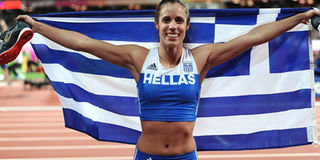IAAF testosterone rule change 'should include all events'

Greek pole vaulter Katerina Stefanidi celebrates after winning the World Pole Vault title in 2017 in London. PHOTO | COURTESY |
What you need to know:
- Track and field's governing body unveiled the rules, which come into effect on November 1, 2018, to counteract hyperandrogenism, the medical condition which causes women to produce high levels of male sex hormones.
- From then, affected athletes will only be able to compete if they take medication to reduce those levels.
DOHA
Greek pole vaulter Katerina Stefanidi has suggested the IAAF trim her taller rivals' arms and legs in their bid for equality, in a swipe at new rules on women's testosterone for certain track events.
Track and field's governing body unveiled the rules, which come into effect on November 1, 2018, to counteract hyperandrogenism, the medical condition which causes women to produce high levels of male sex hormones.
From then, affected athletes will only be able to compete if they take medication to reduce those levels.
But the rules, which the IAAF puts under the heading "Difference of Sexual Development" (DSD), cover only events from 400m to the mile because the IAAF's medical and science department says it has data showing an advantage for hyperandrogenous athletes over such distances.
Pole vaulter Stefanidi, the reigning world, Olympic and European champion, admitted to feeling sympathy for the likes of South Africa's two-time Olympic 800m champion Caster Semenya.
Semenya has long attracted debate because of her powerful physique related to hyper-androgenism, the issue of which is controversial because it pits principles of fair competition against the rights of women born with the condition.
"I feel bad for her," Stefanidi said of Semenya.
"It's not her choice, but at the same time I wish more energy was put into promoting the sport, bringing more money into the sport, more sponsors and more than trying to help one event or an athlete in an event that got second instead of first because somebody else had more natural testosterone.
"There are obviously some issues there, but I cannot judge.
"They (the IAAF) want to create equality, whether that's equality or not... and at which point do you stop? As some people mentioned on social media, I'm one of the shortest girls on the track right now.
"What are we going to do? Are we going to cut everyone's legs or arms to make it equal because there's definitely a correlation between height and pole vault?"
Stefanidi added: "If you're going to have a rule like that then you maybe you should include all the events.
"I just find it bizarre in the way it's only using a few events. If you make a decision like that, maybe include everything. If someone like that comes into the pole vault or high jump, are we going to add those events next year?"
Stefanidi also expressed her concerns about the statistical veracity of the study on 48 pole vaulters between the 2013 and 2015 world championships, the results of which were used to decide whether the event was included within the parameters of the new rules.
"I read the study, I understand the science and statistics and I can tell you the statistics are very problematic," the Greek said, before concluding: "I think genetically superior people will win."





